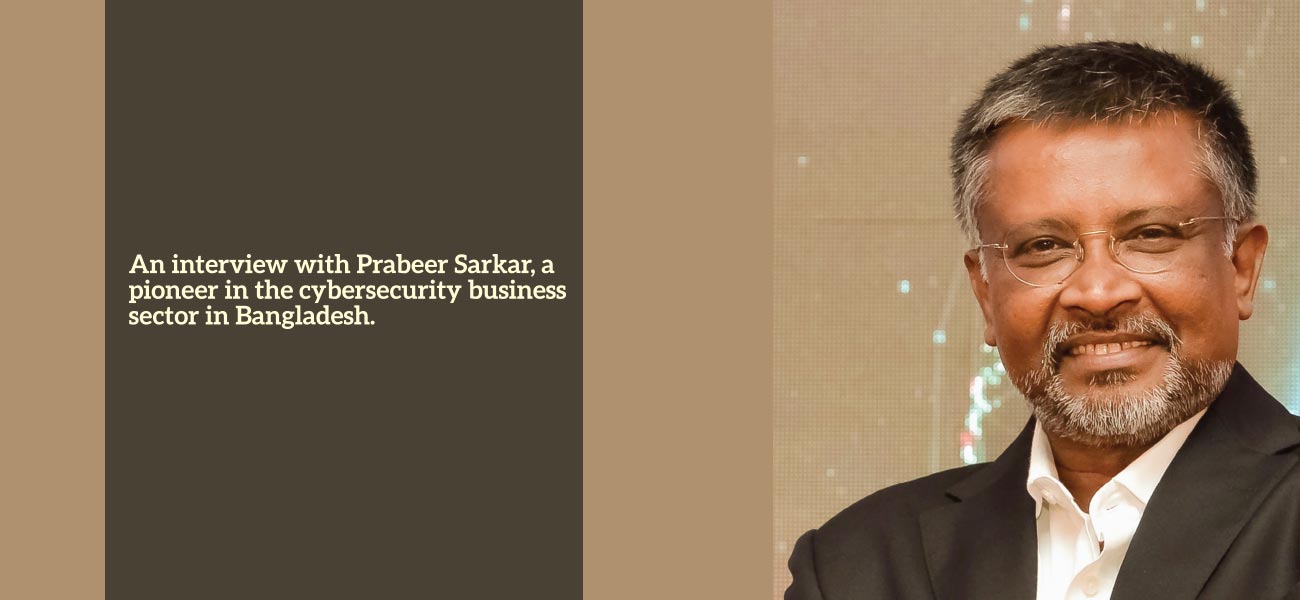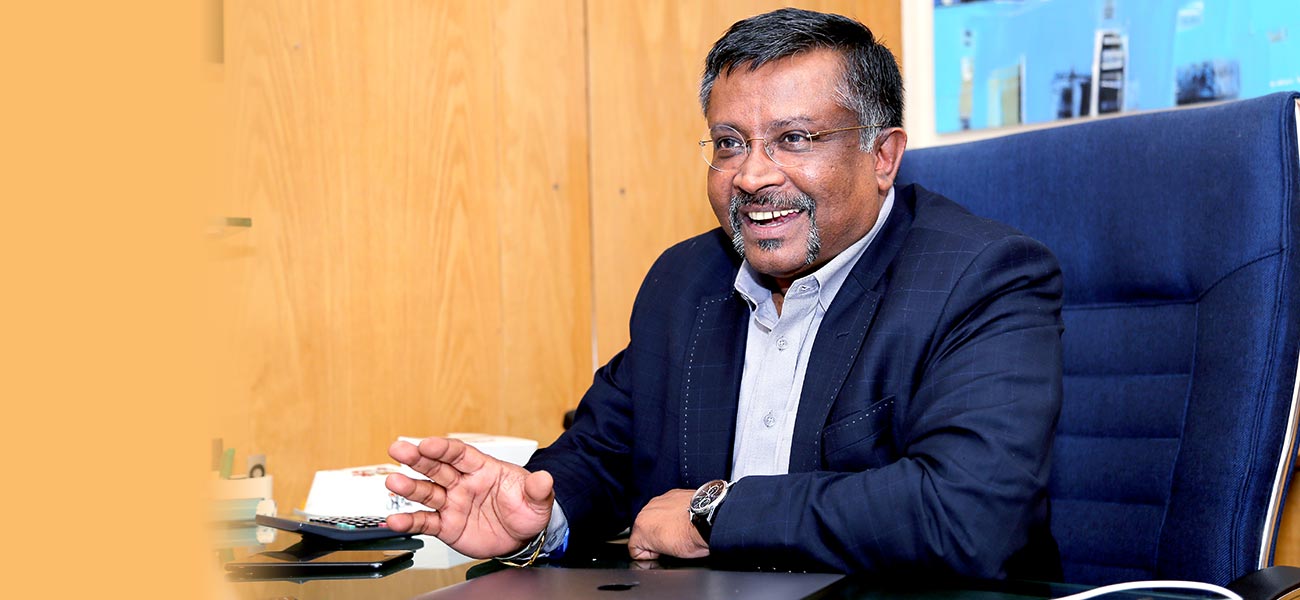
He started a business of cybersecurity when it was not a buzz word or anyone was really concerned in the country. That was a decade ago. And he bet with his business in a high piracy market. It worked out fine. He pioneered a market for legal software in the country. Pioneered a market for cybersecurity products and solutions. And in the process, he pioneered a market for local businesses to take direct distributions for global software brands, particularly from the anti-virus industry, which was all in the hands of business entities in neighbouring countries before. He has contributed generously in the campaign for awareness of cybersecurity in Bangladesh.
Prabeer Sarkar is not a flashy person. But he carries a flashy smile that welcomes anyone immediately. He thinks openly and speaks the same. With over a decade of experience in the cybersecurity business he has an in-depth understanding of the subject. He studies hard. And interacts across various cybersecurity solution providing entities. He claims he is ‘unsocial’ because he gets no time away from these activities. And yet it is quite easy to reach him. He will respond and is open to discussions.
Just recently, he has taken a step forward in the cybersecurity business in Bangladesh. He calls it a reboot.
Fintech was interested to find out what he is thinking and trying to achieve. He has been successful all these years and he is totally focused on cybersecurity, and that being the hottest topic in the digital world, we wanted to understand what he really means by moving into the next level.
We caught up with him at his office for an interview. Excited and energetic, Prabeer Sarkar spoke at length with Fintech about his vision.
FINTECH: How are you? You are talking about changes and moving forward. Are you changing?
Of course I am changing. I am losing weight. I am sure you could not have missed the point that I have lost quite a lot of weight. I need to refresh my wardrobe. That is a change.
But jokes apart, yes, I am moving on. Moving forward actually, onto the next level of cybersecurity business in Bangladesh. I have rebooted myself and my business.
FINTECH: Before talking about the ‘reboot’, as you call it, we wanted to know about a recent news. You gave up Kaspersky Lab distribution quite recently. Are you comfortable to comment on this?
Why should I not be comfortable to answer that? It is true that I terminated the contract with Kaspersky Lab after nearly a decade of relationship forged in success in this market. Immediately after it ended, I notified our partners and customers. I also sent out a press release on the same. The reason was that I was unable to accept the developing business policies and plans from Kaspersky Lab. I believe I have given my best in the development of this market for them and it is reasonable to move out when policies and outlooks clash. It was a very long relationship with them. I did not want to end this in bitterness or failure. So, I made a call. But having done so I am really glad that I did.
FINTECH: You say that you are glad that you made that call. Why?
To most it would appear shocking as you had a great success with that brand. Look, have you seen carriage drawing horses? They put a patch or a hood over the horses’ eyes to make them go on and on without seeing the surroundings. The horses keep running with a focus: only that narrow field of vision in front of them on the road. And they spend their lives within that narrow focus of the road they are toiling thoughtlessly every day. I think I have been that horse for nearly a decade. I was reading, learning, communicating all around on cybersecurity but running the road everyday within that narrow field of vision. My world is illuminated after that call. I have shaken off my eye hoods and come out of the well to find an ocean all around. I guess it was time to move on.
FINTECH: So what did you find all around you?
An immense ocean of scopes and requirements in cybersecurity.
FINTECH: Please explain more. We can see the excitement in your eyes and the readiness to jump into that ocean.
Let’s first accept the fact that cybercrime is out there in a very big way. It’s a curse. A plague for humanity. And it is important to acknowledge its presence in our life. Unfortunately, there is no magic bullet to stop this or prevent it. Cybersecurity is a process. A multilevel process in fact.
Nature evolves, technology evolves faster. And cybercrime evolves even more faster. Today, it is not about how you will be hacked, but rather about when you will be. It is more or less obvious that you can be a cyber crime victim at any point or time. And at this stage cyber resilience is the only response to this critical threat. The ability to rebound back after a cyber incidence.
The aspect of facing cybercrime has changed. Basic endpoint security is an entry level effort to prevent cyber threats. But we all know now that it is not enough at all.
Cybersecurity for organizations, or even the individual is a multi-level effort. You need products, solutions and services to integrate that process. Not just a product. Apart from the fact that you need a strong IT hygiene policy, culture and awareness from the entire human chain involved in the digital phenomena, the apparatus of protection and safeguarding comes from the right combination of cybersecurity technologies. Backup, insider threat management, threat intelligence, threat specific security solutions, and many more.
It is more about creating an eco-system synced between human behavior and technologies. That is what exactly I am moving on to. Providing end-to-end solutions for cybersecurity in Bangladesh by combining some of the world’s most reputed security solution providers under one canopy. A 360-degree offering to potential crisis.
FINTECH: That is interesting. Do you have a plan worked out?
Oh yes. Plan chalked out in details. I am rebooting as a 100 percent cybersecurity company. The first in Bangladesh as far as I know. During the last decade my team has earned a reputation for real tech support in security in Bangladesh. Our customers know that and have tested us over the years. Our partners have immense faith in us because as a distributor we have been true to the genre. We have shared our business with them without ever trespassing into their business domain.
It is the same team from my side. Experienced, skilled and trusted. Combine it with the faith from customers and partners – we have a winning formula. I have already signed up eight distributions for Bangladesh with world renowned security companies. They each are leaders in their fields. Some with products, some with solutions and some in services. I now have a large portfolio under one canopy that can cater to almost all sorts of cybersecurity technologies across all verticals in the market. And that too with 100 percent local support. It could never be better.
This will open doors to many more software companies moving into the market holding hands with local business partners, I have always believed that unless global companies think glocal and forge presence partnerships locally, this IT industry will not benefit. The customers will not get 100 percent benefits and local support, the vendors will not see real business. The Bangladesh market has its own unique flavour. And that needs to be respected and nurtured.

FINTECH: You are opening doors for foreign companies to cater to the local market. Why not invest your efforts into developing similar technologies locally?
I strongly believe that we must develop solutions and software locally. But this is where the question and response gets flat and tricky. I think it is a very flat question and we all respond to this very flatly too.
Listen, first of all, software or IT or whatever you name it is a borderless commodity. What works in the north pole works fine for Bangladesh too. Say for example, WhatsApp. It performs and delivers the same across the globe. Years have been spent on R&D on this product. Every now and then it still gets update patches. Keeps on solving the bugs and security issues. Why should one spend time or waste money on building a similar service? It may work for China with its population and highly defined infrastructure and afford something like WeChat as an alternative. But is Bangladesh in the same sphere?
Building our own messenger platform is not hard. But keeping it secured and stable is the challenge. We don’t have that infrastructure yet and we don’t have the time also. How long should we wait to benefit from a service when technology is evolving so fast? The market size again is not big enough for the ROI. On the other hand, I am focused on cybersecurity technologies. I will prefer to talk in this area as much as I can. When it comes to security, we are not ready yet. Nor is our infrastructure and workforce ready. Cybersecurity is a domain all by itself.
The IT industry is all about innovation: new technologies, new ideas, new utilities. And surrounding all this is a shield of security. New technologies today have to be secured. There is no point in trying to make another operating system like Windows or search engine like Google. It is better to invest and focus on newer solutions. Unique, innovative, performing and safe. That is what we need to make in Bangladesh. The digital Bangladesh movement is taking us far and if our understanding and vision is intact, we can make our own software and reach out to the world too. But to go out there with our products we also need to let others come in. We need to gather the experience. Learn from the international success stories and make our own by learning from those.
Your question was why not make such solutions locally. I say, why not. But when we are ready and capable. We as a nation can if we try. Till then cybersecurity cannot wait. It was supposed to be done yesterday. That unfortunately is the truth about cybersecurity.
FINTECH: What technologies and brands are you launching in Bangladesh? Is it soon?
I will be launching soon. A few I already have. It’s a full basket. Unfortunately, I cannot disclose all information at this moment. But you will be joining us soon to a press conference. I can tell you that it will be a unique assortment of cybersecurity technologies with reputed names. And right now, the industry has a high requirement for them.
FINTECH: Thank you so much for your time. We wish you success ahead.
Thank you for your time. I wish all the Fintech readers all the happiness and safety.








